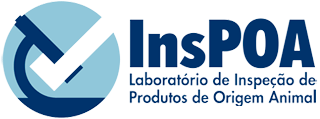About us
Training
You can develop your training at InsPOA; take a look in the options below:
Undegraduate students and professional can be volunteers and follow all scientific activities in InsPOA. Activity plans must be planned based on the current scientific activities and available positions. Volunteers must contact the head researchers for further details.
UFV undergraduate students must register their activities in the SEST-UFV. Volunteers that already finished their undergraduate training must be enrolled through PAP (in Portuguese: Programa de Aprimoramento Profissional de Nível Superior) from the Department of Veterinary Medicine.
Undegraduate students from any university or research center can develop their curricular training at InsPOA. Available positions and activities must be previosuly discussed and planned with the InsPOA head researchers. All curricular trainings must be officially registered in UFV, via SEST, that provides all necessary documents and information: agreement between UFV and the student unit, health insurance, student plan.
Young scientists can receive fellowships from Brazilian supporting agencies (CNPq, CAPES, FAPEMIG), based on demand and specific requirements. These fellowships are usually granted to undergraduate students and InsPOA interns.
In general, fellowship cotas are granted based on specific calls organized by the Office of Graduate Studies from UFV, in which all requirements are specified. Undergraduate students must contact the head researchers from InsPOA to check potential actvities and available positions. UFV usually requests a minimum grade for students that will be enrolled in these programs.
Alternatively, some research projects have fellowhsip quotas granted by the head researchers. As for institutional quotas, the head researchers must be contacted to check available positions and scientific activities.
The main InsPOA mission is to provide high quality training for professionals in topics related to food safety and quality. These trainings can be developed under supervision of the head researchers that are enrolled as supervisors in the one Graduate Programs:
Graduate Program in Veterinary Medicine: Universidade Federal de Viçosa, Grade 7 (CAPES)
These programs are officially registered in CAPES. Further details for registration, selection and available positions are detailed in the Program webpages. Independently of the specific bylaws of each Program, the InsPOA head researchers must be previously contacted in order to check potential activities, plans and available positions.
Professionals that finished their Doctorate trainings, as well as Doctorate students in the end of their trainings, can propose a Post-Doctorate training in InsPOA. As initial request, the head researchers must be contacted to check potential scientific activities and available positions, in coherence with the current research projects and lines.
Post-Doctorate fellowships can be granted by scientific supporting agencies, based on specific calls (CNPq, CAPES, FAPEMIG). UFV was granted with a institutional project from CAPES (CAPES-PRINT), with regular calls for such fellowships.
Independently of a granted fellowship, post-doctorate researchers must be registered as such in UFV for a proper activities plan, supervision and final report, allowing a certificate of the developed activities.
Foreign researchers, as well as Brazilian researchers from other universities and research centers, can develop scientific activities in InsPOA. These activities are usually developed based on scientific cooperation of InsPOA with other research groups, and also due to academic training of Graduate students from other universities.
As initial request, the head researchers must be contacted to check potential scientific activities and available positions, in coherence with the current research projects and lines. Fellowships can be granted by scientific supporting agencies, based on specific calls (CNPq, CAPES, FAPEMIG). UFV was granted with a institutional project from CAPES (CAPES-PRINT), with regular calls for such fellowships.
Independently of a granted fellowship, visiting researchers must be registered as such in UFV for a proper activities plan, supervision and final report, allowing a certificate of the developed activities.


